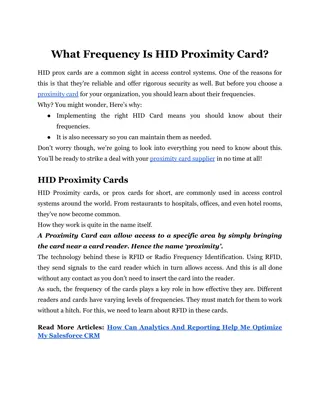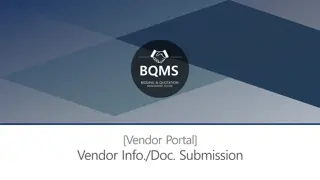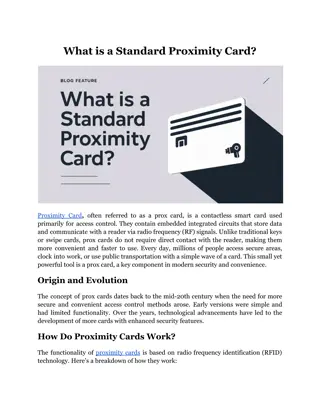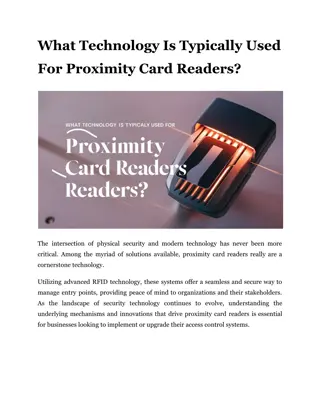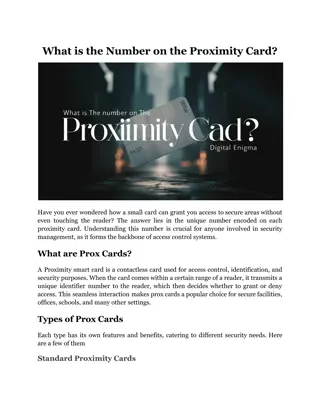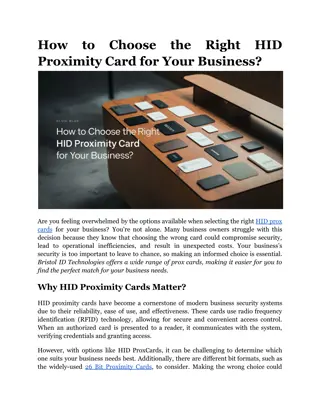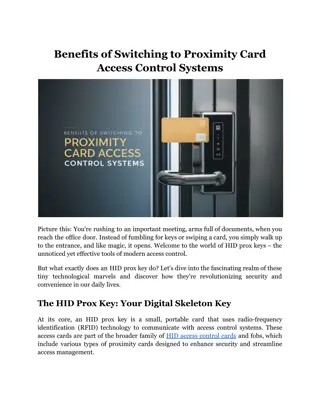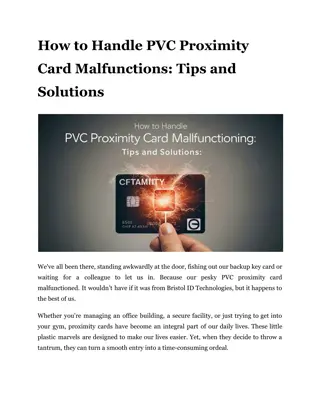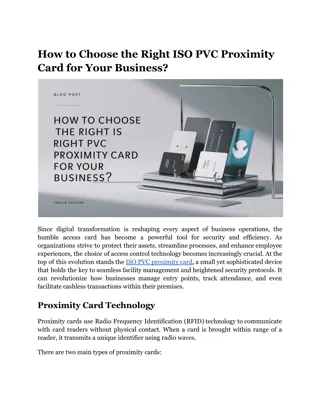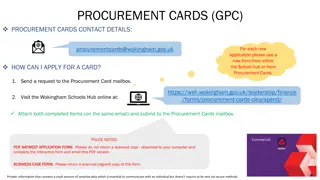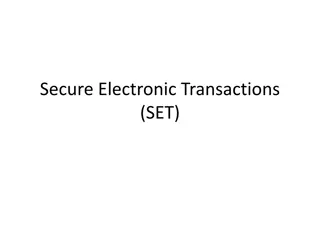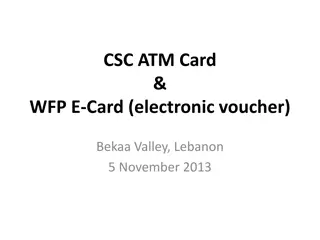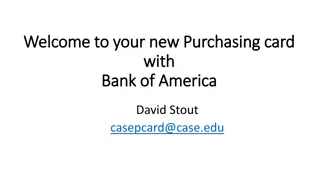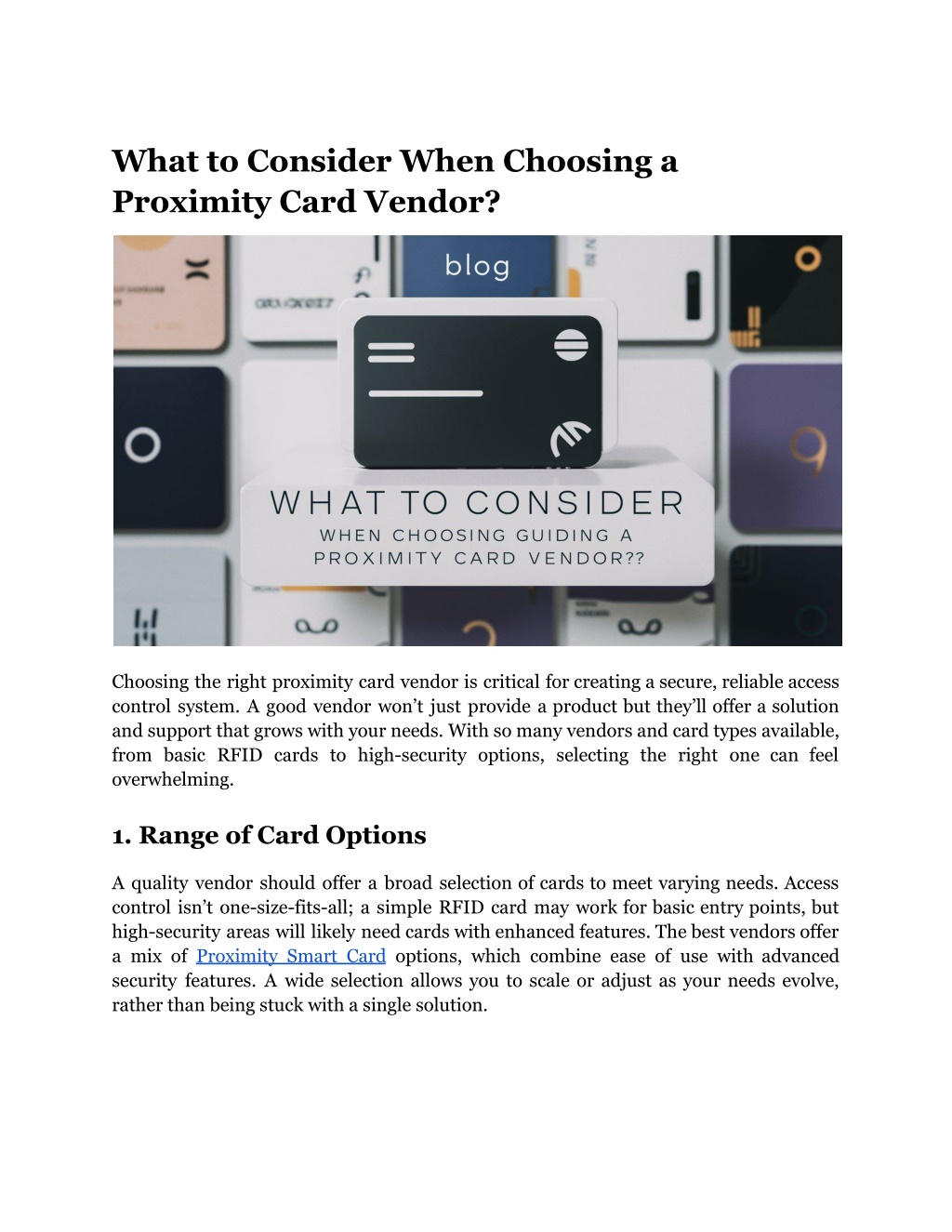
What to Consider When Choosing a Proximity Card Vendor?
Discover essential factors to consider when selecting a proximity card vendor to ensure security and reliability for your business needs.
Download Presentation

Please find below an Image/Link to download the presentation.
The content on the website is provided AS IS for your information and personal use only. It may not be sold, licensed, or shared on other websites without obtaining consent from the author. Download presentation by click this link. If you encounter any issues during the download, it is possible that the publisher has removed the file from their server.
E N D
Presentation Transcript
What to Consider When Choosing a Proximity Card Vendor? Choosing the right proximity card vendor is critical for creating a secure, reliable access control system. A good vendor won t just provide a product but they ll offer a solution and support that grows with your needs. With so many vendors and card types available, from basic RFID cards to high-security options, selecting the right one can feel overwhelming. 1. Range of Card Options A quality vendor should offer a broad selection of cards to meet varying needs. Access control isn t one-size-fits-all; a simple RFID card may work for basic entry points, but high-security areas will likely need cards with enhanced features. The best vendors offer a mix of Proximity Smart Card options, which combine ease of use with advanced security features. A wide selection allows you to scale or adjust as your needs evolve, rather than being stuck with a single solution.
Types of Cards to Consider: Standard Proximity Cards: Basic cards for standard use, ideal for simple, lower-risk access control. HID Prox II: A more durable, secure option for high-use areas and environments where durability is essential. Smart Cards: Advanced cards with built-in data encryption, ideal for sectors requiring robust security. Multi-Technology Cards: Cards that integrate several access technologies, such as RFID, magnetic stripe, and smart card features. Vendors who provide a range of options demonstrate flexibility and the ability to meet diverse client needs. This flexibility is essential, as the needs for a corporate office differ significantly from those for a healthcare facility or a data center. 2. Security Features and Compliance Security is at the core of any access control system. The right vendor should prioritize security features, offering cards with encrypted data, secure credential storage, and, where needed, multi-factor authentication capabilities. If you re looking at HID access control cards, ensure that they support high-level security. Additionally, proximity cards should comply with recognized standards, such as ISO 7816 and FIPS, to ensure they meet industry expectations for safety and reliability. Essential Security Features to Look For: Data Encryption: Cards with encrypted data help prevent unauthorized copying or interception of card data. This is crucial in high-security industries, like finance and government. Secure Credential Storage: Proximity smart cards often have secure credential storage, adding an extra layer of security by keeping sensitive information safe within the card itself. Regulatory Compliance: The best vendors adhere to industry security standards, such as ISO and FIPS. Compliance with these standards signals that the vendor is up-to-date with best practices and committed to data protection. The vendor you choose should be proactive about security, offering solutions that protect your assets from the ground up. Without these essential security features, an access control system may be vulnerable to breaches, undermining the very purpose of the cards.
3. Customization Capabilities In today s market, flexibility and customization are valuable assets. Proximity card vendors who offer customization options allow you to tailor the cards to match your brand or specific security requirements. Whether it s a custom logo, unique color, or advanced data features, customization helps meet organizational needs more effectively. Common Customization Options: Printed Logos and Branding: Branding your cards with logos or custom colors can reinforce company identity and help with easy recognition. Special Formats: Some organizations may need non-standard card formats, such as unique shapes, to distinguish security levels or restrict access to certain groups. Technology Integration: Look for options to integrate multiple technologies, such as magnetic stripes, barcodes, or biometric capabilities, allowing one card to handle multiple functions. A vendor with customization capabilities will be more likely to meet your specific security needs and adapt as those needs evolve. 4. Durability and Longevity Proximity cards endure daily handling, making durability a priority. A reliable vendor should provide cards made from high-quality materials designed to last. Options like the HID Prox Card II are known for their resilience, withstanding thousands of scans and regular handling. When a card system fails due to wear, it can disrupt security and create unforeseen costs. Selecting a vendor with durable card options helps prevent these issues. Durability Factors to Assess: Materials: scratch-resistant and can handle heavy use. Consistent Read Range: Quality cards maintain a reliable read range, even after prolonged use, ensuring users don t have to fight with the reader. Temperature and Moisture Resistance: In environments with temperature fluctuations or high humidity, like industrial settings, resistant cards prevent malfunctions. Cards made from durable materials like polycarbonate are
A vendor focused on quality ensures that their cards maintain performance over time, reducing the hassle and cost of frequent replacements. 5. Vendor Reputation and Experience Choosing a vendor with a strong reputation and a history of success brings peace of mind. Vendors who have served respected companies or worked in high-security industries often understand the nuances of access control. A vendor with positive testimonials and a proven track record shows commitment to quality and customer satisfaction. Look for proximity card vendors who can demonstrate a solid history of delivering reliable solutions. Ways to Evaluate Vendor Reputation: Client Testimonials: Positive testimonials provide insights into other customers satisfaction and the vendor s reliability. Case Studies: Look for documented examples of successful projects, ideally within your industry. Longevity: Vendors with years of experience typically have more established processes, providing greater stability and reliability. A reputable vendor provides peace of mind, knowing you re working with a provider who stands behind their product and service. 6. Technology Integration and Compatibility The cards you choose must be compatible with your existing access control system. Whether you use HID readers, biometrics, or mobile technology, cards must integrate smoothly with your setup. A top-tier vendor will offer options that support cross-platform compatibility. Moreover, technologies, helping you avoid the need for costly upgrades or replacements. they ll stay up-to-date with evolving Key Compatibility Considerations: Reader Compatibility: Cards should be able to work with your existing card readers, ensuring a seamless experience. Software Integration: Whether using proprietary or third-party software, vendors should offer guidance on compatibility. Future-Ready Technology: Vendors focused on innovation keep their cards compatible with evolving technologies, allowing your access control system to scale.
Compatibility saves you time and reduces potential system disruptions, making the security system easier to manage and maintain. 7. Transparent Pricing and Long-Term Value Cost is always a factor, but transparency is just as important. Some vendors may offer low initial prices but add extra fees for replacements, maintenance, or support. A trustworthy vendor should be upfront about these costs, helping you understand the true cost of ownership. Evaluating vendors based on both price and long-term value helps ensure you re making a sound investment. Cost Factors to Assess: Upfront Pricing: Clear, upfront pricing with no hidden fees. Replacement Costs: Policies for replacing lost or damaged cards. Maintenance and Support Fees: Any ongoing costs should be clearly disclosed. A vendor with transparent pricing gives you better control over your budget and helps avoid unexpected costs down the line. 8. Customer Support and Responsiveness Reliable customer support is essential. A vendor who can promptly address issues or answer questions will make your experience smoother and help avoid downtime. Look for vendors who offer a range of support options, including phone, email, and online resources, with knowledgeable staff who can assist with everything from technical questions to troubleshooting. What Good Support Looks Like: Availability: Look for support available through multiple channels, such as phone, email, and live chat. Responsiveness: Quick response times, especially for urgent issues, show commitment to customer satisfaction. Technical Knowledge: Support staff who understand both the product and the technical aspects of access control are invaluable for complex inquiries. Strong support services prevent disruptions, keeping your security system functioning smoothly.
9. Scalability and Flexibility Your access control needs may grow, requiring an access system that can scale. A vendor with scalable options allows your access control system to expand without the need for a full system replacement. This is crucial for businesses with growth plans, multi-location operations, or high turnover rates. Scalability Features to Look For: Multi-Site Support: Vendors who offer solutions for multiple locations save you the cost of managing separate systems. Upgradable Cards and Readers: Cards that support new technologies or additional security features allow your system to adapt as your needs evolve. Modular Options: Some vendors offer modular systems, making it easy to add features or access levels without major changes. A scalable system offers a practical way to accommodate growth, making it ideal for dynamic organizations. 10. Innovation and Industry Leadership Look for vendors who stay ahead of the curve. Proximity card technology has advanced rapidly, integrating features like encryption, multi-factor authentication, and mobile compatibility. Vendors who invest in research and innovation can offer solutions that keep your access control system at the forefront of security. Why Innovation Matters: Advanced Security Features: Innovative vendors provide access cards with enhanced security, such as encrypted data or dual authentication capabilities. Competitive Advantage: Staying current with industry trends keeps your access system effective and compliant. Adaptable Technology: Vendors focused on innovation are more likely to adapt to regulatory changes or shifts in security demands. Final Thoughts Finding a reliable proximity card vendor isn t just about the product but it s about a partnership that supports your access control strategy. From product variety and security features to long-term support and innovation, the right vendor will provide proximity cards that serve your unique needs.
Ready to elevate your access control systems with top-notch proximity cards? At Bristol ID Technologies, we offer reliable solutions tailored to your security needs. Don t compromise on safety contact us today to explore our range of card options and find the perfect fit for your organization. Let s secure your future together! Site Article: What to Consider When Choosing a Proximity Card Vendor?





